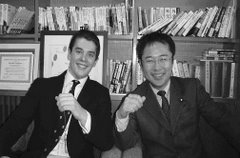The last day of debates in the Lower House Budget Committee is a marvelous--yet incredibly surprising--thing to watch. Old politicians snort out of deep, disinterested slumber and youthful newcomers leap about excitedly. It is traditionally one of the most thrilling days in the Diet calender, and all politicians, whatever their political
allegiances, seem to suddenly remember they are required to do something for their wage-packet.
February 2nd was the day the Liberal Democratic Party-led Government (
LDP) decided to push through the Budget for the new financial year. After a Budget is approved by the Lower House, it is accepted within 30 days regardless of Upper House approval. If this 30 day period extends beyond the 1st April, however, the Government is required to use an emergency Budget--a potentially embarrassing eventuality. In the attempt to force just this result, countless
oppositions have tried to delay Lower House approval of new budgets for as long as humanly possible.
The Democratic Party of Japan (
DPJ), Japan's main opposition party, had called (somewhat vocally) for an extension to debates in the Budget Committee all afternoon, and traded insults with the Liberal Democratic Party (
LDP) with relish. But, the real drama--
de rigeur on such
occasions, it seems
--was yet to come.
At 10.25pm all parties entered the chamber to take the vote on the Budget. In the past, left-wing opposition parties--normally the Communist Party (
JCP) or Japan Socialist Party (
JSP)--had employed the interesting tactic of "cow-walking"
(gyuho) to slow down voting at this point. Opposition politicians, by creeping to the ballot-box at a snail's pace, stretched what might be a 20 minute affair to a 1 1/2 hour marathon in the attempt to delay Budget decisions in the Diet and embarrass the ruling party. [An interesting English article about cow-walking can be found
here]
But tonight was neither an easy vote nor a display of disruptive cow-walking. At around half-past ten at night, 42 year-old
DPJ politician,
Yukio Edano, took central stage for a mammoth display of obstructionist filibuster. Or, as the Japanese might call it, "cow-tongue tactics
"(gyutan senjutsu). The opposition fielded a motion which called for the removal of the Chairman of the Budget Committee,
Kazuyoshi Kaneko, and successfully launched a red-herring into a session that should have been concluded before midnight. As it was, the
DPJ (et al) managed to string proceedings out until 4am on the 3rd, delaying the Budget for a day. The question is, however, what was the point?
By the look of things in the early hours of Saturday morning, the
DPJ could perhaps be reprimanded for endangering the lives of some the more elderly politicians. However, the events of this weekend also raised serious questions about the way Japanese politicians campaign in the Diet.
Why the fuss about extending debate in the Budget Committee, and
why all the filibuster?
Firstly, it is unclear why the opposition were so emphatically calling for an extension of committee debates when their original questioning had been so unenthusiastic (punctuated by snoozing politicians on both sides). "Why you running away?" and "Come back and debate properly!" were the much-repeated battle-cries on Friday. But, if the
DPJ and their opposition allies cared so much about frank debate, surely time would have been better spent hammering-out issues properly in the first place? Of course, in Japan this scramble on the last day is the traditionally-correct way to behave when in opposition. Although it is strange that the DPJ buys into it because history and tradition has never really supported those on 'the other side' in Japanese politics.
Secondly, was there any point in the obstructionism--led by
Edano--that kept politicians, bureaucrats and secretaries at their posts until the wee hours of Saturday morning? The weekend newspapers were curiously quiet about the whole affair. If the
DPJ intended to build up tension and 'fight' in preparation for looming elections, it was a sad flop. Even if they actually disagreed with the Budget and intended to try and stop it, a quick look at the
LDP majority (or with Komeito, an absolute majority) in the House of Representatives would have revealed this was an impossible struggle. To many on the outside, it looked like the country's lawmakers were having the political
equivalent of a
matsuri--a festival. And this may well be what they were doing.
Instead of cow-walking, cow-tongue rhetoric or any other variation of immature (yet, admittedly rather fun) opposition, it might be pleasant to see frank, aggressive and well-informed debate. As I have
written in another post, politics does not currently glow with interest. Until opposition politicians learn about their own policies and
acquire the ability to critique those formulated by the Government, a regime change may well remain elusive.
R J F Villar














